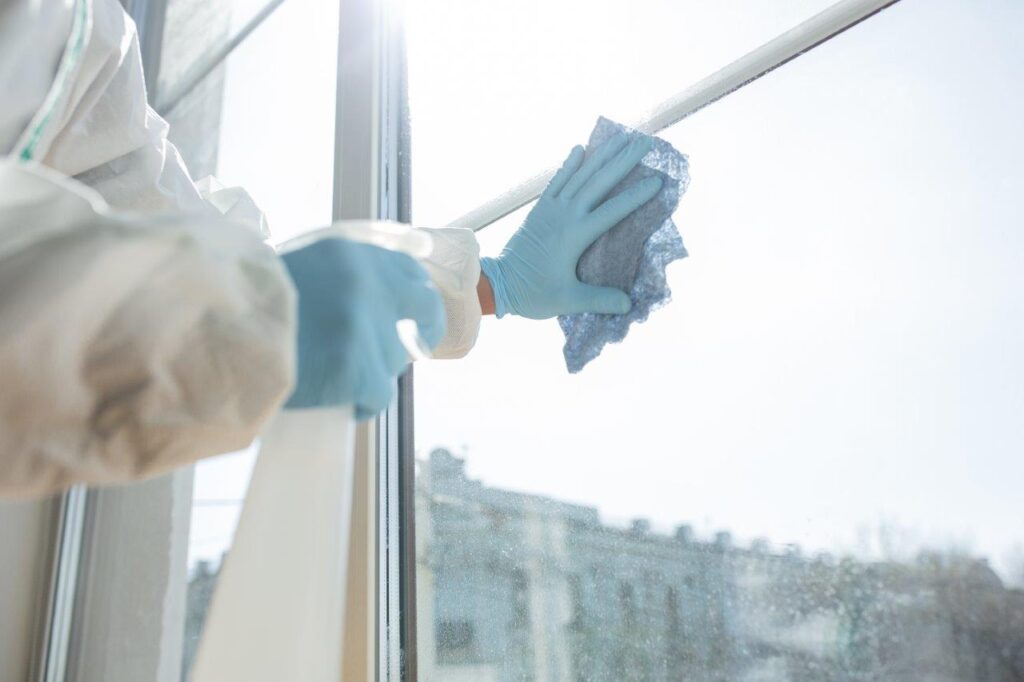How can you disinfect your home during COVID-19?
- Constantly sweep floors
- Dust rooms regularly
- Clean high-touch surfaces
- Wash sheets and clothes
- Don’t leave dishes in the sink
There are not enough words to emphasize the need for people to protect themselves against COVID-19. Disinfecting your home from COVID-19 is a necessity, especially if you spend the majority of your time at home and constantly interacting with different family members. Because of this, keeping the entire household clean and maintaining the overall safety of the family are the two priorities. Read on to find out the most effective COVID-19 home sanitation tips.
Constantly sweep floors
One of the simplest ways of keeping a home COVID-19 free is by sweeping floors. You need to make it a habit to sweep the floors not purely for aesthetic reasons, but for health reasons as well.
Using a heavy-duty broom and dustpan, start sweeping through areas of high foot activity, meaning areas where people most often stay. These can be the dining room, kitchen, bedrooms, bathrooms, and the living room.
As you may know, protecting yourself against COVID-19 is all about avoiding transmission of droplets through high-touch surfaces. If you’re not practicing effective sweeping methods in combination with other cleaning tips, these contaminants may make their way into the floor and then have the particles transfer into the air. A simple activity like this can easily brighten up your household and keep the germs and potential diseases away from your family.
Dust rooms regularly
In line with sweeping the floors, you should also make it a habit to dust your rooms regularly. Staying indoors means that certain areas of your house will become more prone to dirt, dust, and grime — eliminating them is a great way of ensuring everyone’s safety.
Though there is little evidence to support that the COVID-19 virus can be directly transmitted airborne, this does not mean that it cannot serve as a means by which respiratory droplets can get on people’s skin. Knowing this, it’s important that you dust the least-touched objects in the household.
The most effective tool for dusting is using a high-powered vacuum cleaner which can easily collect debris and clean up large mounds of dust which can be difficult to reach. Make sure you have the proper attachments to allow the vacuum to reach wall corners and small spaces. This is another effective way of preventing allergies and other more potentially serious illnesses among your family members.
Clean high-touch surfaces
You have to pay attention to the most high-touch surfaces in your house. Even if no one in the family is leaving the house, cleaning such items like door handles, remote controls, phones, light switches, common computers, toilet seats, table surfaces, and the like is paramount in reducing the risk of transmission.
Before cleaning them, wipe off the dust using a microfiber cloth. You then need to apply a multi-purpose cleaner to wipe them clean. After which, you would have to spray them with a proper disinfectant such as isopropyl alcohol, or hydrogen peroxide. Don’t cut corners and simply use antibacterial wipes, as these may not be effective in eliminating bacteria on these surfaces.
Make sure you’re using disposable gloves as you’re cleaning these areas. See to it that you won’t come into contact with other objects in order to prevent cross-contamination.
Wash sheets and clothes
Another home sanitation practice you would want to adopt for your home is washing sheets and clothes as regularly as possible.
When someone in your family is going outside, they can unknowingly bring in foreign substances into the home. This can be made even worse especially if the entire household is using the same bedsheets and pillows since these substances can stick to the clothing of the person.
Sheets which are often used on the skin, like towels, bedsheets, and pillowcases should undergo washing more frequently. It’s typically recommended to wash these items at least twice a week. Couple this activity with hygiene practices such as proper handwashing and taking showers for maximum effect.
Don’t leave dishes in the sink
The kitchen and dining areas are just two of the areas you need to direct greater attention to. As your family is spending more time at home, they might also find themselves resorting to activities such as cooking and eating.
You have to make sure that the kitchen is spotless after every activity. One way to do this is by doing away with the habit of just having used dishes and plates just lying in the sink, or on tables, for that matter. These unclean dishes can serve as a breeding ground for cockroaches, ants, and vermin — you certainly wouldn’t want these potentially disease-carrying animals into your home.
When washing dishes, make it a point to top up on dishwashing liquid. Aside from this, it’s also important that overused sponges and kitchen towels be replaced, as a way of maintaining kitchen hygiene.
Key Takeaway
The threat of the virus is not something that should be taken lightly. A way by which you can do your part is by ensuring you practice the proper hygiene practices and disinfecting your home from COVID-19.
If you want to learn more about other effective home sanitation tips, click the button below to get invaluable advice from your favorite real estate brokers.

